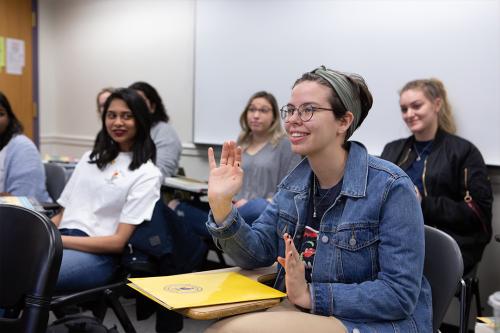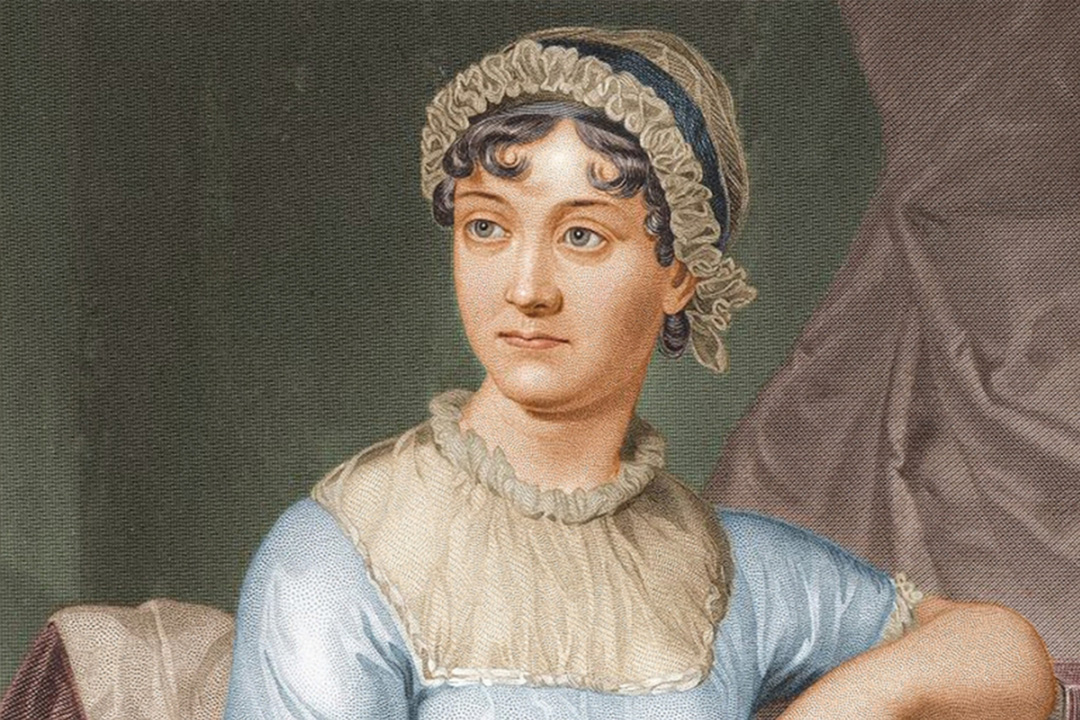A few years ago, Professor of English Tara Wallace was invited to speak on a Smithsonian panel about the celebrated novelist Jane Austen. Wallace was a natural choice. She’s written a book and several scholarly articles on Austen’s literary impact, and she's taught her fiction in numerous undergraduate and graduate courses. Along the way, Wallace estimates she’s read some of Austen’s novels as much as 100 times.
But her fellow panelists had very different credentials. One had published a novel called Sense and Sensibility and Sea Monsters, which imagined Austen’s Regency-era characters fighting a two-headed sea serpent. Another penned a version of Pride and Prejudice in the world of zombies, and a third wrote a book that cast Mr. Darcy as a vampire. The panelists were cheered by an audience that included women in bonnets and Empire-waist ball gowns.
Wallace had entered the bizarre world of Jane Austen fandom—a culture of almost cult-like devotion to the 19th century author, where admirers can quote Emma Woodhouse and Elizabeth Bennet while playing Whist and showing off their Austen action figures. Whether at academic settings like the Smithsonian or meetings of the 5,000-member Jane Austen Society of North America (JASNA), Wallace has spoken to packs of self-described “Janeites” who revere Austen with a fervor usually reserved for Trekkies and Comic-Con crowds.
“It can be a little disconcerting,” Wallace laughed. “I am giving these very conventional academic talks, and there are people in the front row wearing Regency caps and doing embroidery. And, by the way, they know Austen better than most critics.”
Far from turning a scholarly nose up to the Austen enthusiasts, Wallace’s journey among the Janeites inspired her Dean’s Seminar, The Austen Phenomenon. For the third straight year, Wallace is teaching a small group of first-year students to view one of history’s most beloved authors through both an academic and pop-culture lens.
“Austen is second—and just barely second—to Shakespeare in the amount of interest and writing that she produces,” Wallace said. “In some ways, she’s more popular than Shakespeare. There aren't a whole lot of people who read Shakespeare just for fun at bedtime. But there are a lot of people who do that with Austen.”
The class explores why an unassuming author from the English countryside who produced just six slim novels in her short lifetime is still adored like a literary rock star. Students read all of Austen’s novels, watch several of the dozens of movies adapted from her work and even tackle the sea monsters.
“I always find myself looking forward to this class,” said first-year student Anne Donovan, who plans on double majoring in political science and history. “The discussions are lively. . . . It’s fun and humorous to fully discover this side of Jane Austen.”
Jane Austen, Superstar
Austen received little fame in her own lifetime. But shortly after her death at 41 in 1817, her books gained popularity in English literary circles. As early as the 1870s, critics praised the sharp language and feminist undertones behind her romances. During World War I, soldiers read Austen in the trenches. Rudyard Kipling's 1926 short story “The Janeites” describes British battlefield troops in a secret Austen fan club. Most trace the modern Austen frenzy to the 1997 BBC production of Pride and Prejudice, which famously featured Darcy emerging from his private lake in a clinging wet shirt. (The shirt was recently exhibited at the Folger Shakespeare Library.) Austen blogs, forums and fan fiction abound across the Internet, with some sites drawing 10 million hits a month. And this month marked the release of the fourth film adaption of the novel Emma.
With her elegantly crafted plots and characters, Austen has always been read as both a serious literary voice and a romance novelist, Wallace noted. “There is a sense in which she provides a kind of fantasy fulfillment—even for her earliest readers,” she said. “People read Pride and Prejudice as a great love story in the same way that people read Romeo and Juliet as a great love story. But Darcy and Elizabeth live, so it’s a much more satisfying ending.”
Austen's novels were also among the first literary works to challenge gender and social convention. “I think Jane Austen has become a feminist icon for lots of young women,” said Donovan, who was introduced to Austen in the 7th grade when her mother gave her a copy of Pride and Prejudice. “Her novels portray heroines that stray from generalized female stereotypes … and it is just as difficult for young women today to stray from societal expectations and conventions.”
Wallace challenges her students to see Austen within the context of her own times. The Dean’s Seminar format, which offers small-classroom settings to encourage discussions among first-year students, has provided an ideal setting for intense conversations about Austen’s perspectives on culture, economics and social hierarchies, Wallace said.

First-year students in Wallace’s class include: (front, from left) Tanvi Korgaonkar, Julia Kerrigan, (back, from left) Katie Ambrozy and Zazni Vlijter.
“Austen’s stories endure because of the romance and humanity in the relationships she writes about,” said economics major Katie Ambrozy. “But her couples are also equal pairings, which is somewhat radical for her time when women had to marry for money rather than love.”
Class discussions can take off in a range of directions. In one session, Wallace deconstructed the “gentle Jane” myth of Austen as timid chick-lit by highlighting the “very snarky” language of her novels and letters, Donovan said. And the class has also veered into contemporary issues from wealth inequality to the MeToo movement. “It’s nice to be in a room full of women discussing these heroines—it’s something that is rarely offered in an academic setting,” said Tanvi Korgaonkar, a political science and psychology major.
From Janeites to zombie fiction, Wallace employs Austen fandom as a reflection of the author’s literary influence and her continued relevance. It also complies with Wallace’s first law of reading Austen: “Have fun,” she said. And while Wallace isn’t a fan of many of the sequels and modern mash-ups, there is one that she admires. “I really do like the Sea Monsters,” she said. “It does a good job of capturing her tone: edgy and subtle at the same time. I think Austen would have enjoyed it.”


